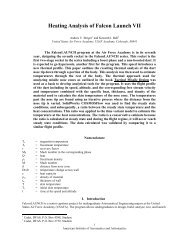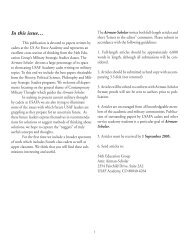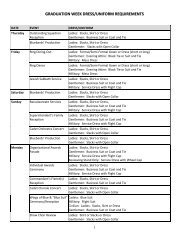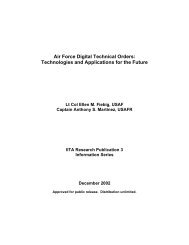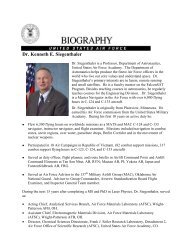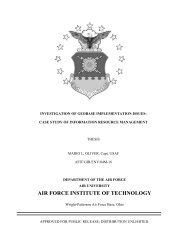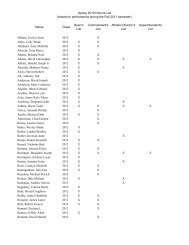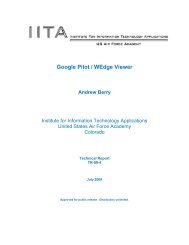the rollback of south africa's biological warfare program
the rollback of south africa's biological warfare program
the rollback of south africa's biological warfare program
You also want an ePaper? Increase the reach of your titles
YUMPU automatically turns print PDFs into web optimized ePapers that Google loves.
e delivered through food and water, but <strong>the</strong> weapons could spread into one’s<br />
own population.<br />
10 Interviews with South African military and civilian <strong>of</strong>ficials, July 2000.<br />
11 For a fur<strong>the</strong>r discussion <strong>of</strong> <strong>the</strong> role <strong>of</strong> former Selous Scouts and o<strong>the</strong>r<br />
foreigners in South Africa during <strong>the</strong> 1980s see Mangold, 218-23. See also,<br />
Henrik Ellert, The Rhodesian Front War: Counter-Insurgency and Guerrilla<br />
war in Rhodesia 1962-1980 (Gweru: Zimbabwe: Mambo Press, 1989).<br />
12 Analysis <strong>of</strong> <strong>the</strong> TRC Report by <strong>the</strong> SADF Contact bureau, 28 May, 1998,<br />
Pretoria, South Africa, and The Military in a political arena: The South<br />
African Defence Force (SADF) and <strong>the</strong> Truth and Reconciliation Commission<br />
(TRC), Pretoria, June 2000.<br />
13 There was a general awareness during <strong>the</strong> 1960s <strong>of</strong> <strong>the</strong> potency <strong>of</strong> anthrax<br />
and o<strong>the</strong>r <strong>biological</strong> agents as counter-insurgency weapons. In <strong>the</strong> 1960s,<br />
comic books featured “Captain Devil” who poured anthrax into <strong>the</strong> Orange<br />
River and killed communist guerrillas, according to Dr. Ian Phillips, ANC<br />
defense expert, interviewed, 13 June 2000 in Pretoria, South Africa.<br />
14 South African military and political planners during <strong>the</strong> late 1960s and early<br />
1970s studied carefully <strong>the</strong> effectiveness <strong>of</strong> Portuguese “protected villages” in<br />
preventing guerrillas from gaining control <strong>of</strong> large sections <strong>of</strong> Angola.<br />
However, South African planners viewed a guerrilla threat at home to be<br />
highly unlikely at <strong>the</strong> time (Interview with Rocklyn Williams 5 July 2000). In<br />
planning for <strong>the</strong> long-term possibility <strong>of</strong> guerrilla activity, <strong>the</strong> government<br />
moved to expand <strong>the</strong> Bantu homeland policy to Lebowa and Venda and<br />
instituted policies to depopulate nor<strong>the</strong>rn areas <strong>of</strong> South Africa. This approach<br />
was viewed as a more effective way <strong>of</strong> handling future problems and<br />
deflecting external critics with a promise <strong>of</strong> eventual independence for <strong>the</strong> ten<br />
designated homelands.<br />
In Angola, South African military planners however, were impressed by<br />
<strong>the</strong> ability <strong>of</strong> <strong>the</strong> Portuguese to regain <strong>the</strong> <strong>of</strong>fensive in <strong>the</strong> late 1960s by using<br />
helicopters, poison, landmines, and o<strong>the</strong>r techniques to counter guerrilla gains.<br />
See John Marcum, The Angolan Revolution: Exile Politics and Guerrilla<br />
Warfare, 1962-1976 (Cambridge, Mass.: MIT Press, 1978), 116-118.<br />
15 Interview with Dr. Ian Phillips, 13 June 2000.<br />
16 The South African Police (SAP) started helping <strong>the</strong> Rhodesians to counter<br />
growing insurgency problem in <strong>the</strong> mid-1960s. Until 1974, <strong>the</strong> number <strong>of</strong> SAP<br />
(and SADF) personnel grew, until <strong>the</strong>re were about 1,200 SAPs stationed in<br />
Rhodesia. While South African help was welcomed initially, tensions quickly<br />
developed with reports that SAP personnel were illegally shooting<br />
93




